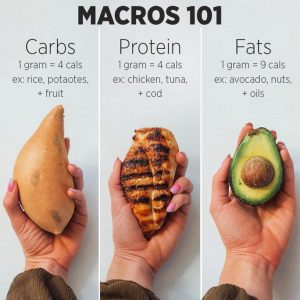Counting macros is just one of many great tools that can assist you in achieving your health and fitness goals sooner. This consists of keeping track of the types of foods that you eat as well as your calorie intake. The three macronutrients we need to keep track of are carbohydrates, fats & proteins. It is important to know how many calories are in each macronutrient:
– Carbohydrates have 4 calories in each gram
– Fats have 9 calories per gram
– Proteins have 4 calories per gram

@meowmeix
Carbohydrates
Carbs consist of sugars, starches and fibres which get broken down into glucose, which your body uses for energy or stores as glycogen. Making up the largest portion of your calorie intake, experts recommend we consume 45-65% of carbs daily (1) We can typically find carbohydrates in foods like beans, grains & starchy vegetables.
Fats
Out of all the nutrients, fats have the most calories. They are important for critical functions such as nutrient absorption and giving your body energy. The recommended percentage of fats we should be consuming per day is 20-35% of our total calories. It is recommended to choose foods with ‘good’ unsaturated fats like avocado, nuts, vegetable oils and fish (2).
Proteins
Proteins are important for your body to be able to build and repair tissue, make enzymes and hormones as well as regulate your immune system. The best part is that they keep you feeling fuller for longer! The typical macronutrient recommendation for proteins range from 10-35% of your total calorie intake. Examples of foods rich in protein include eggs, meat, fish, dairy and lentils.

How to Count your Macros
The following steps can be used when counting your macronutrients:
1. Determine how many calories you want to eat each day.
2. Find your ideal ratio of macronutrients that you’d like to be consuming per day. Typical recommendations are as follows (3)
– Carbs: 45-65% of total calories
– Fats: 20-35% of total calories
– Proteins: 10-35% of total calories
You can alter these ratios depending on your goals and what you are trying to achieve e.g. to shed weight or gain muscle mass.
3. Multiply your total daily calories by your percentages
4. Divide your calorie amounts by its calorie-per-gram number
Example
Assume we’re following a 1,800-calorie diet consisting of 40% carbs, 30% protein and 30% fat.
Carbs:
– 4 calories per gram
– 40% of 1800 calories = 720 calories of carbs per day
– Total grams of carbs you would consume per day = 720/4 = 180 grams
Proteins:
– 4 calories per gram
– 30% of 1800 calories = 540 calories of protein per day
– Total grams of protein you would consume per day = 540/4 = 135 grams
Fats:
– 9 calories per gram
– 30% of 1800 calories = 540 of fat per day
– Total grams of fat you would consume per day = 540/9 = 60 grams
Using this information and simple maths, we can determine how many grams of macronutrients we would be consuming per day. In this case our daily intake would be 180g of carbs, 135g of protein and 60g of fat.

Counting your macronutrients may provide several benefits to your heath. This includes improvements to your diet quality, assisting with specific goals and may promote weight loss. The My Fitness Pal app is a great tool to help track your macros.
IMPROVE YOUR HEALTH & FITNESS PLAN AT CRUNCH FITNESS
No matter where you are with your health & fitness plan, we can provide the advice you need to move forward to reach your goals. Our certified world-class personal trainers are here to help you and make you feel confident with your fitness journey.
Many of our Personal Trainers here at Crunch Fitness have qualifications in Nutrition & Weight management and can be of help regarding nutritional advice. Head over to the crunch Personal Training Page to get into contact with one of our PTs today!
Disclaimer
The information provided is for general informational and educational purposes only, and is not a substitute for professional health and fitness advice. We advise that you alter your health and fitness plan to suit your needs as each individual has different macronutrient needs. Accordingly, before taking any actions based upon such information, we encourage you to consult with the appropriate fitness and healthcare professionals. The use or reliance of any information in this blog is solely at your own risk.


Crunch Fitness Virtual Assistant
 I'd like some help reaching my Fitness goals!
I'd like some help reaching my Fitness goals! I'm an existing member and would like some help!
I'm an existing member and would like some help! I have some questions about becoming a Crunch member!
I have some questions about becoming a Crunch member! AU
AU United States
United States Canada
Canada Costa Rica
Costa Rica Spain
Spain Portugal
Portugal NSW Clubs
NSW Clubs VIC Clubs
VIC Clubs